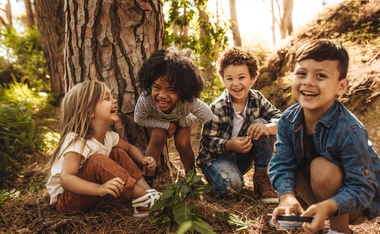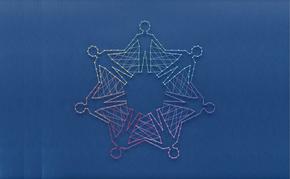The views expressed in our content reflect individual perspectives and do not represent the authoritative views of the Baha'i Faith.
How can we help our society bear fruit?
I love the smell of rain on a spring day. Rain is essential to the life of human beings, and without it, nothing could grow: the beautiful vegetation that adorns our world would die, the trees would not bear fruit, and nothing would blossom.
A few days ago, I was teaching a Baha’i children’s class, where we explore the importance of virtues like love, patience and obedience with children from many different backgrounds. In every class, we help the children memorize a quote that helps them learn and understand the virtue they’re learning that day.
One day, we memorized this quote:
Ye are the trees of My garden; ye must give forth goodly and wondrous fruits. – Baha’u’llah, The Hidden Words, p. 50.
Each class offers something special, and this one was no exception. “Ohhh, so like apples, mangoes and bananas!” said one of the children. And without giving me time to answer, another one said: “just as trees give us apples and mangoes, we must bear fruits of good things.”
This made me smile. I was happy to see how clear and logical it was for children to understand what the true fruits of our lives really are.
Beyond popular belief, what determines whether we have a fruitful life is not our material achievements, but our spiritual ones. Our good deeds and spiritual qualities are the true fruits of our life.
At that moment, this was easy to understand for that eight-year-old. But as we grow, this clarity starts to fade. Things do not seem so simple anymore. Being honest is considered naive in our competitive society. Patience is a virtue that we lose due to the speed of the world around us. Respect depends solely on how much affinity of thoughts and ideology we have with others. Tolerance is only important if applied to us and our group. This subjectivity of values is embedded in the very core of our society.
I found myself thinking, if all of us are like trees that should bear fruits, what factors could cause us to not give the expected fruits?
Firstly, the land where our tree is planted is one of the key factors. This makes me think of how often we are affected by our environment, be it a harmful or positive influence. Often, negative forces exert much more pressure on us, but this does not completely determine our future, since many people who have grown up in harmful environments do fall far from the tree.
Second, the nutrients our tree receives are important for its growth. So, I began to think about how this might resemble our education: the source of the vital nutrients we need for our lives. If we are raised with a good education—not one that only develops our intellect, but also develops our spiritual qualities—that would help us have a fruitful life.
Another factor is the climate: the strong changes in temperature. A strong unexpected frost, for example, will challenge the ability of the tree to bear fruit. People face countless difficulties that challenge their ability to be better people every day. A strong adversity can challenge our patience, our trust in God, our ability to forgive or show love. If we overcome this, then we become stronger and wiser in the face of adversity.
Finally, the rain. In my head, it symbolizes the blessings we receive from God, like a rain that falls on us, refreshes us and makes us grow. Regardless of where we were born, or what our skin color or economic situation is, the rain falls on everyone without distinction, giving us the opportunity to grow and be better.
Man has always had and will always have the ability to overcome the challenges that arise, and to be of benefit to humanity. It is up to each one of us to help our society bear spiritual fruits. This begins by working on ourselves and making sure that we show qualities such as love, kindness, tolerance, respect, justice and empathy with every single person without distinction. But is also our responsibility to help and educate the younger trees, so that in this way they can also learn to bear fruit and be of benefit to the world they are to inherit.
The Baha’i teachings say:
Every child is potentially the light of the world—and at the same time its darkness; wherefore must the question of education be accounted as of primary importance. From his infancy, the child must be nursed at the breast of God’s love, and nurtured in the embrace of His knowledge, that he may radiate light, grow in spirituality, be filled with wisdom and learning, and take on the characteristics of the angelic host. – Abdu’l-Baha, Selections of the Writings of Abdu’l-Baha, pp. 130-131.
In Baha’i children’s classes, we teach children to reflect on these topics at an early age, so that in their sensitive minds and spiritual hearts can grow these vital concepts and principles that will help renew our society and create a world in which justice is the norm, unity the standard, and love the very core.
Children are a treasure that we have not yet fully appreciated as a society. In them lies the promise of the future, and if we pay a little attention, we will see the great potential they have to show empathy and justice.
Children are the most precious treasure a community can possess, for in them are the promise and guarantee of the future. They bear the seeds of the character of future society which is largely shaped by what the adults constituting the community do or fail to do with respect to children. They are a trust no community can neglect with impunity… An atmosphere needs to be maintained in which children feel that they belong to the community and share in its purpose. — The Universal House of Justice, To the Baha’is of the World, Ridván 2000.
While it’s raining outside, that smell that I like so much keeps spreading. The rain falls on everyone, providing life to every living being. Whether you are a mango tree or an apple tree, the rain will fall and give you the opportunity to grow and fulfill your purpose on this earth.
















Comments
Sign in or create an account
Continue with Googleor